Shark Tank and More
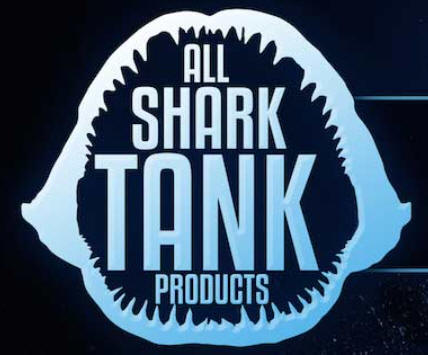
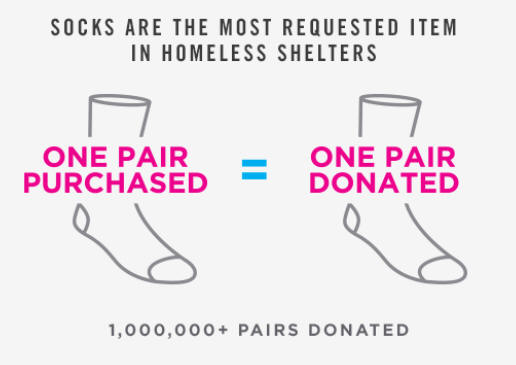
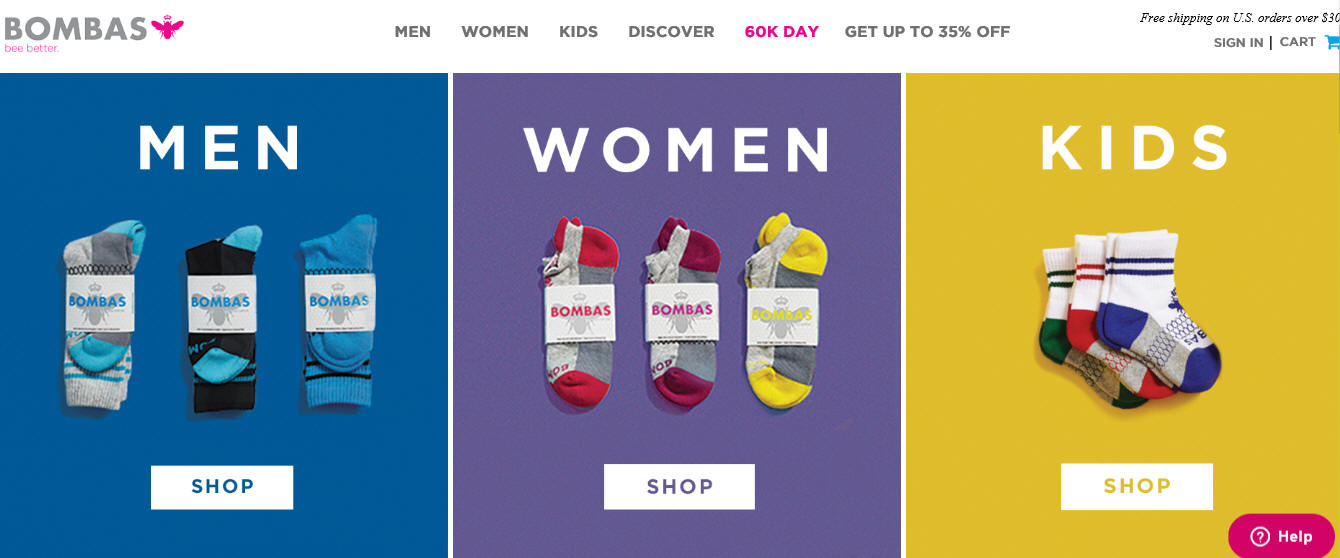
___________________________________________________

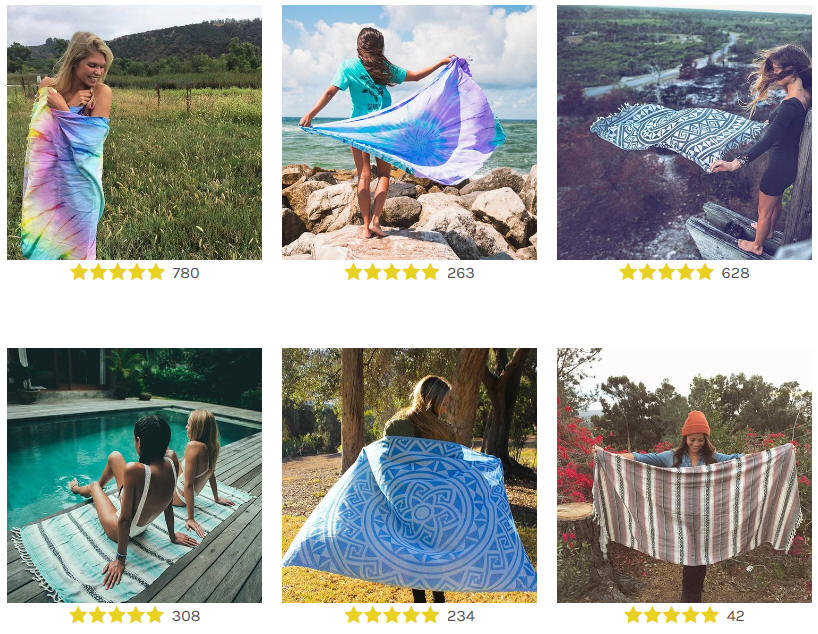

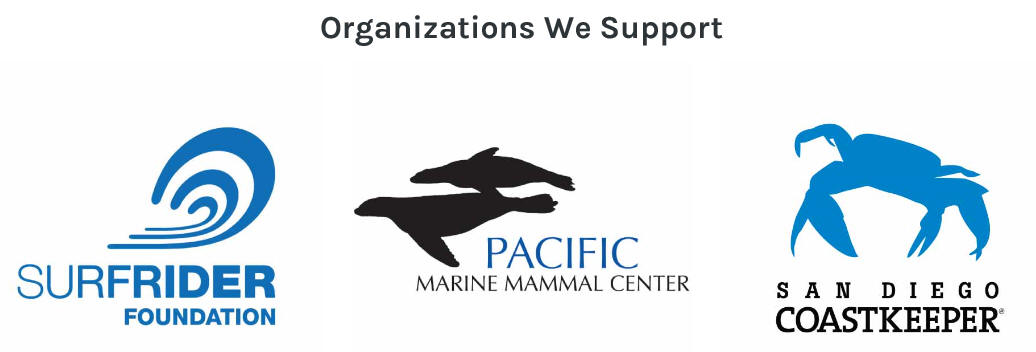
___________________________________________________

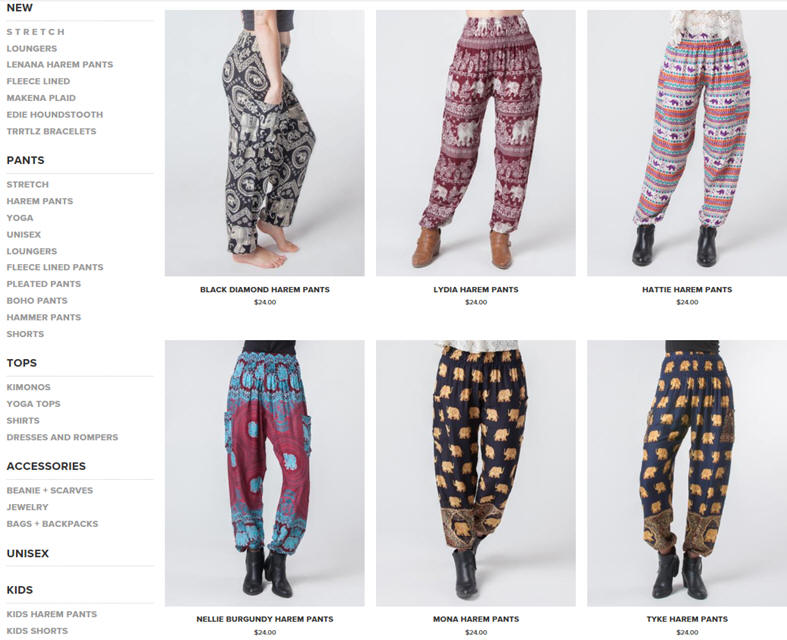
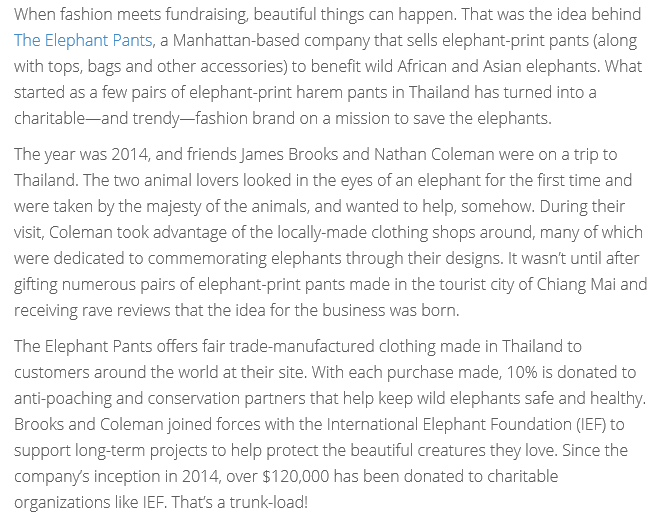
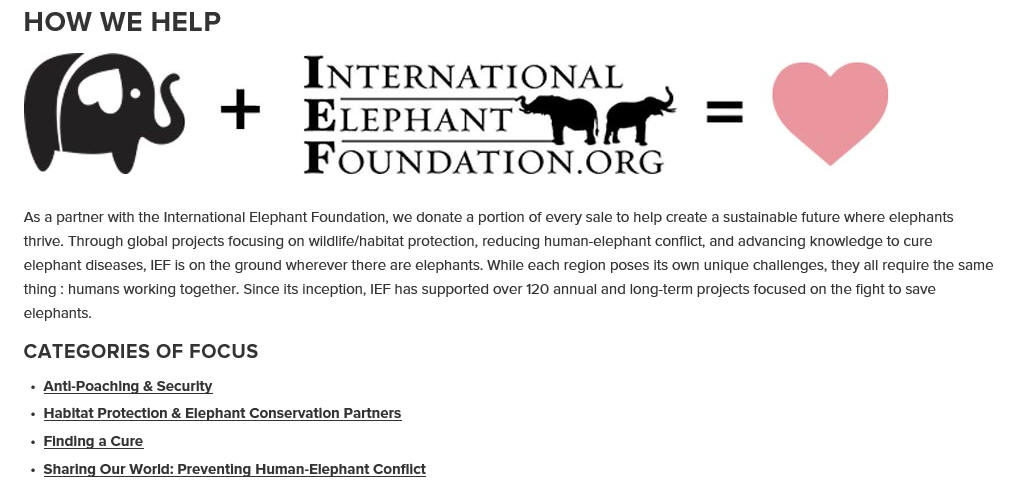
10 Most Successful Products from Shark
Tank
With seven seasons and 142 episodes under its belt, ABC's
entrepreneur pitch show,
Shark Tank, has seen it all. The premise of the show is simple: inventors and
entrepreneurs pitch their
products to real-life investors (called sharks). The sharks evaluate the
products and decide whether to back the fledgling companies with their own
money. From alarm clocks that wake you up with the smell of bacon, to a scented
candle that simulates the most alluring scents to attract a man (apparently this
is beer, pot roast and barbecue), the show has exposed its audience of 7.5
million viewers to some of the silliest inventions ever conceived. However, over
the years, the sharks have also seen some great ideas that just needed an
investor (with deep pockets) to take off. Here are the top 10 most successful
products that got their start in the Shark Tank (sales figures from the
Financial Post).
10.
Simple Sugars
The Product: All-natural
skin care products made from non-genetically
modified pure cane sugar and a custom blend of all-natural oils.
Sharks that bit: Entrepreneur and investor
Mark Cuban ($100,000 for
33% in equity).
Sales: 18-year-old founder Lani Lazzaro saw sales of her product jump to
$220,000 from $50,000 within a day of her episode’s premier. Sales hit the $1
million mark just six weeks later. In
fiscal year 2014 (the most
recent figures available) Simple Sugars brought in $3 million in revenue.
9.
ReadeRest
The Product: A magnetic eyewear holder that allows users to fasten their glasses
somewhere on their body.
Sharks that bit: Inventor and investor Lori Greiner, known as the warm-blooded
shark and the Queen of
QVC ($150,000 for 65% of
the company).
Sales: More than $8 million total sales since the Shark Tank pitch.
8.
Lollacup
The Product: A BPA and phthalate-free children’s drinking cup featuring a
flexible straw that allows toddlers to drink easily and effectively.
Sharks that bit: Mark Cuban and Croatia-born, Canadian entrepreneur
Robert Herjavec ($100,000
for 40% equity in the company).
Sales: More than $1 million in sales since the Shark Tank pitch.
7.
Wicked Good
Cupcakes
The Product: Gourmet cupcakes in a jar shipped nationwide.
Shark that bit: Canadian investor and financial
pundit Kevin O’Leary, known as the tough shark
($75,000 for royalties and $1 per cupcake sold until he broke even, then $.50
per cupcake thereafter).
Sales: Have grown to
$4.8 million annually.
6.
ChordBuddy
The Product: A device that attaches to a guitar’s neck, allowing beginners to
learn guitar chords without overly stressing their fingers.
Sharks that bit: Robert Herjavec ($175,000 for a 20% stake).
Sales: Herjavec secured country singer John Rich of Big and Rich as a
spokesperson. ChordBuddy expected sales of $2 million in FY 2014 (the most
recent figures available), up from $150,000 prior to the Shark Tank appearance.
5.
Ten Thirty
One Productions
The Product: Live-action horror entertainment company (think haunted house hay
rides on steroids).
Sharks that bit: Mark Cuban ($2 million for a 20% stake).
Sales: The company has counted more than 400,000 customers since launch in 2009,
$3 million in revenue in
FY 2014 and
aimed for $5 million in
revenue in 2015.
4.
Breathometer
The Product: A portable breathalyzer that plugs directly into the headphone jack
of most smartphones.
Sharks that bit: All five sharks bit. They are Mark Cuban, Kevin O’Leary, Robert
Herjavec, Lori Greiner and FUBU clothing company
CEO
and founder Daymond John ($650,000 for a 30% stake).
Sales: The Breathometer saw $10 million in sales in FY 2014 and
expected to hit $20 million
in FY 2015.
3.
Buggy Beds
The Product: An early detection and prevention system for bed bugs.
Sharks that bit: All five sharks bit. They are Kevin O’Leary, Robert Herjavec,
Mark Cuban, Daymond John and
real estate entrepreneur
and investor Barbara Corcoran ($250,000 for 25%).
Sales: International growth across 23 countries with sales of more than $1.2
million after the Shark Tank pitch.
2.
Groovebook
The Product: A subscription-based service that allows customers to receive a
bound book of high-resolution photos taken from their smartphones.
Sharks that bit: Mark Cuban and Kevin O’Leary ($150,000 in exchange for 80%
licensing profits).
Sales: A gain of 50,000 subscribers shortly after the pitch. Acquired by
Shutterfly Inc. (SFLY)
in 2014 for $14.5 million.
1.
Scrub Daddy
The Product: A reusable super sponge in the shape of a smiling face that gets
firm in cold water and soft in warm water. Scrub Daddy has also been lab tested
to rinse clear of debris and resist odors for up to two months. The ergonomic
shape is designed to clean both sides of kitchen utensils at once.
Sharks that bit: Lori Greiner ($200,000 for 20% equity).
Sales: Scrub Daddy has moved 10 million units for total sales of more than $50
million since the pitch. Before Shark Tank, the company had $100,000 in sales.
Honorable Mention:
Copa Di Vino
The Product: A portfolio of seven different wines in a recycled glass-like
container (patented) with a resealable, pull-off lid.
Sharks that bit: None. Despite two appearances on the show, a deal could not be
reached with the sharks.
Sales: Copa Di Vina had sales of $500,000 before the pitch and
$25 million after the pitch.
The Bottom Line
Over the years, the Shark Tank stage has seen many great ideas and also a lot of
duds. The countdown of its 10 greatest products demonstrate there is still room
for new ideas. No doubt, by
offering exposure to millions of viewers and funding from shark investors, the
Shark Tank will continue to launch
successful entrepreneurs
and products.
_________________________________________________________________
Shark Tank
Emily Kendy 04.24.14
Business 459Shares
“Why didn’t I come up with that?” How many times have you watched an episode of
Shark Tank and pondered that question, while some guy in updated camouflage or a
girl with a cat toilet pitches the practical applications of their products?
It’s happened to many fans of the show, no doubt, given the fact 500+ business
ideas have been showcased in the tank over five seasons. But if it makes you
feel better, more than 50 per cent of those “great” ideas that are OK’d on air
don’t end up sealing deals for investments off-camera. Not that it matters to
the 8 million viewers tuning in every week to watch what happens in front of the
cameras for the 0.4 % of applicants that actually make it through the audition
rounds for a spot on air.
While sometimes the business tycoons in
the comfy chairs (aka: the Sharks) take the bait, often times they will rip a
newbie entrepreneur to bits, shredding ineffective sales pitches, marketing
plans or crummy products to bloody lifeless pulps. Too graphic? Well, it can get
ugly in the Shark Tank. So it’s a spectacular feat for those that come out of
the tank with all the limbs of their business intact, to shake hands with
business gurus like
Barbara Corcoran,
Daymond John or
Mark Cuban. The clever few
who’ve landed the coveted golden handshake see rewards that don’t just come in
the form of invaluable business partnerships after the show. The Primetime
exposure can lead to $1 million in sales within 48-hours of viewing. Now that’s
one heck of a return on investment! Below is a list of ten of the most
successful pitches to date.
10. Kisstixx – $500,000
This sexy lip balm sold the chemistry factor after encouraging a demo smooch
between Corcoran and Mr. Wonderful (aka: Kevin O’Leary) . It was enough to
solidify a deal with Mark Cuban, who seems to have a decent sense of humour.
Owners Dallas Robinson and Mike Buonomo got a deal of $200,000 for Cuban’s 40
per cent stake in the company.
The creators came up with the flavoured duo stick lip-balm after their time in
University saw them honing their make-out skills. Immediately following their
appearance on the show, the company saw a traffic increase of 3,000% to their
website, selling an instant 5,000+ units. In the months since, the business duo
has found distribution in over seven countries, while currently receiving some
friendly promo assistance from country music star Danielle Peck.
9. AVA the Elephant – $1 million.
Long-time viewers of the show will no doubt remember this adorable pitch by
young mom Tiffany Krumins. The product, which helps kids take their medicine in
an elephant-friendly way, is noted as one of the first and biggest Shark Tank
Success stories.
Tiffany appeared on the show in 2009, and although she didn’t have a patent yet
for her medicine dispenser – much to Kevin O’Leary’s disgust – Barbara Corcoran
stepped up and made a deal with the feisty entrepreneur of $50,000 for 50 per
cent. The deal was worth it, to say the least. AVA the Elephant is currently
sold in over 10,000 retail outlets including giant drug store chains CVS and
Walgreens, and available in 10 countries. A sudden bout of cancer didn’t slow
Krumins down; she’s since overcome the disease and has continued to build the
brand of AVA with Corcoran’s help, as well as developing more AVA products.
8. Daisy Cakes – +$1.2 million
Mother-daughter team Kim “Daisy” Nelson and Geraldine Adams brought their deal
to the tank in 2011. Nelson, a South Carolina baker with a back-pocket full of
old family recipes, had parlayed her skills into a popular mail-order cake
business. While she pointed out, on the show, that the male sharks were gobbling
up the cake but reticent to make a deal, Barbara saw the irony and stepped up
with the offer of $50,000 for 25 per cent.
Since the partnership, Nelson has been highlighted on QVC several times, as well
as other daytime shows including “The Nate Berkus Show,” “Anderson Cooper,” and
“The Today Show.” With Corcoran’s help, the growth of Daisy Cakes has seen the
company move from Nelson’s parents’ kitchen to taking the baking industry by
storm.
7. The Painted Pretzel – +$1.5 million
As a way to exemplify the pursuit of happiness to her young son, stay-at-home
mom Raven Thomas decided to follow her dream of entrepreneurship and created The
Painted Pretzel, a company that sells sweet and salty chocolate covered
pretzels. Her product was such an instant success she found it difficult to keep
up with the orders and appeared in the tank in 2012.
With $140,000 in orders she needed to fill and merchandise already available in
Neiman Marcus, as well as a $2 million deal with Sam’s Club that she had to walk
away from, Thomas needed help, fast. She got it from Mark Cuban who was
impressed with her business acumen and she accepted his deal of $100,000 for 25
per cent. Sales shot up even higher after airing and in 2014 she expects to
reach $1.15 – $1.5 million in revenue. She’s also been able to diversify her
portfolio of clients from big-box stores to specializing in corporate gifting
with Fortune 500 companies across the country. Her son is no doubt inspired and
proud of this gutsy mom!
6. ChordBuddy – $2 million
As a music teacher for over 30 years, Travis Perry knew a thing or two about the
challenges kids faced when learning chords on the guitar. In an effort to
decrease the numbers of frustrated students quitting before they got the hang of
it, he developed ChordBuddy, a simple device that mounts to the guitar and
allows the player to work on right hand rhythm patterns until they’ve learned
the chords on their own.
Perry appeared in the tank in 2012, and quickly won over Robert Herjavec, who
offered $175,000 for 20 per cent. Revenue doubled over the next year and as of
2013 was nearing the $1.5 million mark. Herjavec also made an appearance after
the show to help promote the ChordBuddy on the Canada Shopping Channel, while a
QVC appearance is in the works. Currently the product sells in 200 retail
outlets, and Perry has since developed a line of acoustic guitars as well. The
company has also signed their own spokesperson, country star John Rich, from the
duo Big & Rich.
5. Pork Barrel BBQ – +$4.1 million
The sharks were skeptical when founders Heath Hall and Brett Thompson stepped
into the tank in 2009 with their BBQ sauce and tempted the sharks with the
announcement that they had 10,000 units ready to go. Kevin Harrington asked the
obvious question, “What if they don’t sell?” And Barbara Corcoran took a bite
out of the businessmen with a quip that Hall would suit a pig costume. But it
wasn’t long before Corcoran was changing her tune, and she saw the potential for
big business, eventually offering them $50,000 for 50 per cent.
Immediately after airing on the show, Costco called to inquire about stocking
the company’s products, while NASCAR teams approached the business about
partnership opportunities, and Country singer George Strait requested that the
company sponsor his upcoming concert tour. While their first year’s revenue by
the time the show aired was a measly $5000, the sauce has been bringing home the
bacon since, with roughly $4 million in annual sales. In 2011, the company
launched a self-titled restaurant in Alexandria, Va. and presented at the 2012
World Business Forum. They’ve since added five other products, including an
all-purpose spice rub, and today their products can be found in more than 3,500
stores in U.S., Europe and Canada. And, naturally, the company has won a number
of barbecue competitions, including the 2012 Sam’s Club National BBQ Tour.
4. Tower Paddle Boards – $5 million
The pitch that looked like it was drowning ended up swimming past most of the
competition. Appearing on the show in 2012, Stephan Aarstol froze during his
pitch. But he pushed through his jitters and made his business sound enticing
enough to lure Mark Cuban in at $150,000 for 30 per cent.
Since the show aired the company went from $100,000 in lifetime sales to just
under a million in a few months, with sales of $1.5 million in 2011, on track
for triple that in 2014. As of today, Tower Paddle Boards are now available in
40+ countries. Aarstol is an example for all future entrepreneurs to the show:
even if you get in trouble in the tank you can still keep the sharks at bay – in
the best way – with a little determination and refusal to be defeated. Not to be
attempted in an actual shark tank, obviously.
3. Readerest – $8 million
One of the more memorable and enigmatic pitchers to the show,
Rick Hopper tripped his way onto the set to demonstrate his product Readerest
(formerly SpecSecure). The magnetic eyeglass holder was a simple and ingenious
solution to an age-old problem. While Kevin O’Leary saw only “a piece of metal
with two magnets,” Lori Greiner saw dollar signs and secured a deal with Hopper
at $150,000 for 65 per cent.
Prior to appearing on the show, Hopper’s product revenue was somewhere around
the $65,000 mark. Revenue as of 2012 was a cool $3 million with $8 million plus
in the last two years. Readerest currently employs 14 in a 6,000 sq/ft building
and the product is sold in over 6,000 stores, while Hopper recently sat down for
deal opportunities with Wal-Mart, Ace Hardware and Walgreens. The great sales
success can also be owed to the popularity of Greiner’s QVC show. Hopper
couldn’t be more thrilled; as an entrepreneur and inventor since the age of 13,
his experiments to find a way to hold his reading glasses on his shirt have
since proven the most lucrative. Kevin O’Leary must be kicking himself, at least
a little bit, for his lack of imagination on this one.
2. Plate Topper – $10 million
A doctor with an interest in food storage seemed an unlikely
opener for this pitch from Michael Tseng in 2014. The storage device, known as
PlateTopper, is a plastic, storage container-meets-suction device that keeps
itself fastened to a plate and makes storing leftovers more convenient. Tseng,
an engineer by hobby, was working on the invention for years before entering the
tank. He piqued the interest of a number of sharks, who started a bidding war
for the product and set a record for the length of time he spent on set – two
hours – through the brow-mopping tension of negotiations.
Amazingly, when it was all said and done, Tseng walked away without a deal. That
hasn’t hurt PlateTopper’s phenomenal success. He’s been able to stock the
shelves in 1000 Walmart locations as well as landing a placement on walmart.com,
after winning their American-Idol style contest called “Get On The Shelf”.
Despite no deal being solidified with Lori Greiner during the due diligence
process after the show, he continues to sell regularly, and successfully, on
QVC.
1. Scrub Daddy – $18 million
And who could forget another one of those “Why didn’t I think of that?” moments
on the show with inventor Aaron Krause’s bright happy-faced pitch for his
product, Scrub Daddy. The cleaning product changes firmness depending on the
temperature of the water to tackle any cleaning task you can think of around the
house. It’s superb versatility and infomercial-type pitch from Krause was a
clincher for Lori Greiner who fought off Kevin O’Leary and Daymond John with a
negotiated offer of $200,000 for 20 per cent. Since airing on the show in 2012,
the product has rocketed from $100,000 in sales to $18 million. It’s been
featured on QVC a number of times, selling out in every instance, the first
appearance taking less than six minutes to do so. It is currently in 1000s of
retail outlets across the country, and Krause is now working with Greiner on new
product lines including scrub blocks.
____________________________________________________
Shark Tank is an
American
reality television series
that premiered on August 9, 2009, on
ABC.
The show is a franchise of the international format
Dragons' Den, which originated in Japan in 2001.
Shark Tank shows aspiring
entrepreneur-contestants as they make business
presentations to a panel of "shark"
investors,
who then choose whether or not to invest.
Shark Tank has been
a ratings success in its time slot and has won the
Primetime Emmy Award for Outstanding Structured Reality
Program three times. The show is currently in
its eighth season, which premiered on September 23, 2016.Shark
Tank is produced by
Mark Burnett and based on
the format
Dragons' Den, which originated in 2001 with the
Japanese show Tigers of Money.
The show, however,
more closely resembles the format of the British version,
Dragons' Den, which
premiered in 2005.
The show features a
panel of potential investors, called "sharks," who consider offers from aspiring
entrepreneurs seeking investments for their business or product.
The sharks are paid
for their participation in the show, but the money they invest is their own.
The entrepreneur
can make a deal on the show if a panel member is interested. However, if all of
the panel members opt out, the entrepreneur leaves empty-handed.
The show is said to
portray "the drama of pitch meetings and the interaction between the
entrepreneurs and tycoons."
A one-hour pitch by
a contestant is edited down to "a dramatic 10-minute segment."
_________________________________________________________
The 15 biggest 'Shark Tank' success stories of all time
Entrepreneurs who make it onto a
"Shark Tank" episode have the
opportunity to introduce their
company to a viewing audience of
7 million potential customers.
The companies that land a
deal with one or more of the
show's investors then have the
chance to scale and, in some
cases, become a nationally
recognized brand.
We looked through old
episodes and asked the Sharks
themselves about their most
successful deals. Read on to
learn about the biggest "Shark
Tank" success stories so far.
Scrub Daddy
A sponge
company has far and away become
the biggest "Shark Tank" success
story. Over the past three
years,
Scrub Daddy has brought in a
total of $75 million in revenue,
according to investor Lori
Greiner.
Greiner made a deal with its
founder and CEO, Aaron Krause,
in Season 4 for $200,000 in
exchange for 20% equity. At that
point, Krause had struggled to
reach $100,000 in sales over 18
months, but Greiner saw great
potential in the company's
signature offering, a
proprietary smiley-faced sponge
that was more durable, hygienic,
and effective than a traditional
one.
She helped Krause expand his
product line and brought them
onto QVC and into stores like
Bed, Bath & Beyond, where they
have become bestsellers.
Tipsy Elves
When Robert
Herjavec invested $100,000 for
10% of Evan Mendelsohn and Nick
Morton's ugly Christmas-sweater
company in Season 4, it could
seem to viewers that he was
betting on a fleeting fad. It
turned out, though, to be his
most profitable "Shark Tank"
investment, he told Business
Insider.
To stay ahead
of trends, Herjavec helped make
Tipsy Elves a year-round
novelty apparel company that can
capitalize off multiple holidays
and college-football season.
Before its
2013 "Shark Tank" appearance,
Tipsy Elves made $900,000 in
annual revenue. Last year it
brought in around $8 million,
and this year it's on track to
make $12 million, according to
the company.
Breathometer
In Season 5,
Charles Yim got a five-Shark
deal for
Breathometer, a portable
Breathalyzer that works with a
smartphone. Mark Cuban, Kevin
O'Leary, Daymond John, Herjavec,
and Greiner got in on a $650,000
deal for 30% of the company.
Since his
"Shark Tank" appearance, Yim
secured
an additional $6.5 million in
funding, partnered with the
prestigious Cleveland Clinic,
and developed a more accurate
and more portable main product
in addition to a device that
tracks oral health and hydration
levels.
Yim told Inc. that
Breathometer is expected to end
2015 with $20 million in sales —
double last year's number.
Bubba's-Q
Boneless Ribs
Al "Bubba"
Baker, 1978 NFL Defensive Rookie
of the Year, secured a deal with
John in Season 5 for $300,000 in
exchange for 30% equity in and
licensing rights to his
company, Bubba's-Q
Boneless Ribs.
John told
Business Insider that as someone
who built a career in fashion,
he never expected that his most
profitable investment would be
in a rib business.
John helped
Baker secure a deal with a
large-scale food processing
plant and said he thinks he can
soon get Bubba's-Q to become a
national brand with $200 million
in lifetime sales.
Grace and
Lace
In Season 5,
Barbara Corcoran invested
$175,000 for 10% of
husband-and-wife duo Melissa and
Rick Hinnant's fashion company
Grace and Lace. Corcoran
told Business Insider that it's
her most profitable "Shark Tank"
investment.
Before their
appearance, the Hinnants brought
in about $1 million in sales.
They are now expecting $6.5
million this year, a boost
helped by an appearance in
Cosmopolitan magazine.
As the company
has grown, its philanthropic
mission has as well, and since
appearing on the show it has
used profits to open two
orphanages in India, housing a
total of 100 kids.
Ten Thirty
One Productions
In Season 5,
Cuban decided to put up $2
million for 20% of Melissa
Carbone's live
horror-entertainment company
Ten Thirty One Productions.
Last year the
company brought in $3 million in
revenue, and although he did not
disclose an exact number, Cuban
told us it is making at least
half a million dollars in annual
profit.
Ten Thirty One
had another successful Halloween
season this year in its
birthplace of Los Angeles, but
struggled in its expansion to
New York City due to a lack of
preparation for storm
conditions.
Carbone said it was a stressful
but valuable learning experience,
and she looks forward to
expanding to Cuban's hometown,
Dallas, next year.
Wicked Good
Cupcakes
Tracey Noonan
and Danielle Vilagie are a
mother-daughter duo from Boston
with a company that makes
cupcakes in a jar. In Season 4,
they made a deal with O'Leary in
which he invested $75,000 for
royalties instead of equity. He
made $1 from every cupcake sold
until he made his money back,
and then began receiving 50
cents per cupcake sold.
Since its
appearance on the show,
Wicked Good Cupcakes has
expanded to a new production
facility and a couple of new
locations.
O'Leary said
it's been his most profitable
investment of the show, and
since Noonan and Vilagie
appeared, they've gone from
around $7,000 in monthly sales
to $400,000, or about $4.8
million annually.
Red Dress
Boutique
Cuban and
Herjavec split a $1.2 million
investment for 10% equity in
Diana and Josh Harbour's online
women's fashion retailer
The Red Dress Boutique in
Season 6, with Cuban taking the
lead advisory role.
In the week
following their television
appearance, the husband-and-wife
team brought in $1 million in
sales, but also couldn't keep up
with demand. Cuban helped them
with infrastructure issues, and
last year they brought in $14
million in revenue.
Cuban
said it's making at least half a
million dollars in annual
profit.
Bombas
In Season 6,
Bombas cofounders gave John
a 17.5% stake in their company
for $200,000. It is an
online-only athletic sock
company that donates a pair of
socks to a homeless shelter for
every pair sold.
Bombas'
founders
told radio host Jason Bax
that they sold $400,000 of socks
in the four days after their
television appearance and ended
2014 with $2 million in sales.
John said it
is one of his most profitable
investments.
Simple
Sugars
Lani Lazzari
was just 18 when she entered the
tank in Season 4 to pitch her
skincare company
Simple Sugars. She ended up
making a deal with Cuban for
$100,000 in return for 33%
equity.
Within just 24
hours of her episode's premiere,
Lazzari's sales jumped to
$220,000 from $50,000, and she
hit $1 million six weeks later.
Today Simple Sugars products are
in more than 700 retail
locations and ship
internationally.
Last year the
company brought in more than $3
million in revenue, and Cuban
said it's one of his most
profitable investments from the
show.
GrooveBook
Husband-and-wife team Brian and
Julie Whiteman came into the
tank in Season 3 to present
GrooveBook, a digital-photo
subscription service. For $2.99
a month, users get a bound book
of high-resolution photos they
took with their smartphones. The
founders made a deal with Cuban
and O'Leary for $150,000 in
exchange for 80% of licensing
profits, with O'Leary taking the
lead advisory role.
Not only did
the Whitemans gain 50,000
subscribers shortly after the
premiere of their episode, but
last November, the publicly
traded company
Shutterfly bought GrooveBook for
$14.5 million.
Cousins
Maine Lobster
Cousins Sabin
Lomac and Jim Tselikis shipped
lobster from their home state of
Maine to their new home in
California and started a
high-end food truck named
Cousins Maine Lobster, which
became known for its lobster
rolls. The cousins made a deal
with Corcoran for $55,000 in
exchange for 15% of their
company in Season 4.
Shortly after
their episode premiered, the
company hit $700,000 in sales.
Last year they brought in $8
million in revenue,
according to Entrepreneur.
Bottle
Breacher
Former Navy
SEAL Eli Crane and his wife and
business partner Jen made a deal
with Cuban and O'Leary for
$150,000 in exchange for a 20%
stake in
Bottle Breacher, a
company staffed by military
veterans who turn dummy
.50-caliber bullets into
stylized bottle openers.
O'Leary has
taken the lead brand ambassador
role and said it's one of his
most profitable investments.
It's continued to grow to meet
increasing demand, and has made
more than $2.5 million in sales
this year.
Lumio
Herjavec
invested $350,000 for 10% of Max
Gunawan's foldable,
magnetic-lamp company
Lumio in Season 6 after
calling him "possibly the best
entrepreneur" he had seen so far
on the show.
Last year
Lumio made $3 million in sales,
hitting that mark again this
past June,
he told Forbes. He explained
that his growth is healthy and
that he will continue to make
distribution deals with stores
that appeal to a high-end,
artistic audience.
ReadeRest
Rick Hopper
essentially handed the reins of
ReadeRest over to Greiner
when he agreed to a $150,000
investment in exchange for 65%
of the company in Season 3, but
it turned his little one-man
show into a huge success.
The product, a
magnetic clip that holds
eyeglasses in place on a shirt,
regularly sells out on QVC. Readerest
says it's made $13 million in
revenue in the three years
following the "Shark Tank"
appearance.
_________________________________________________________________________________________
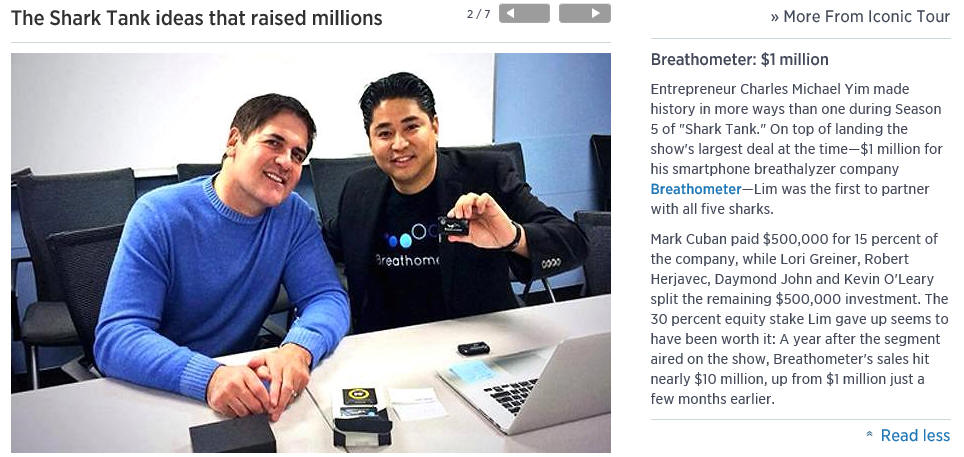
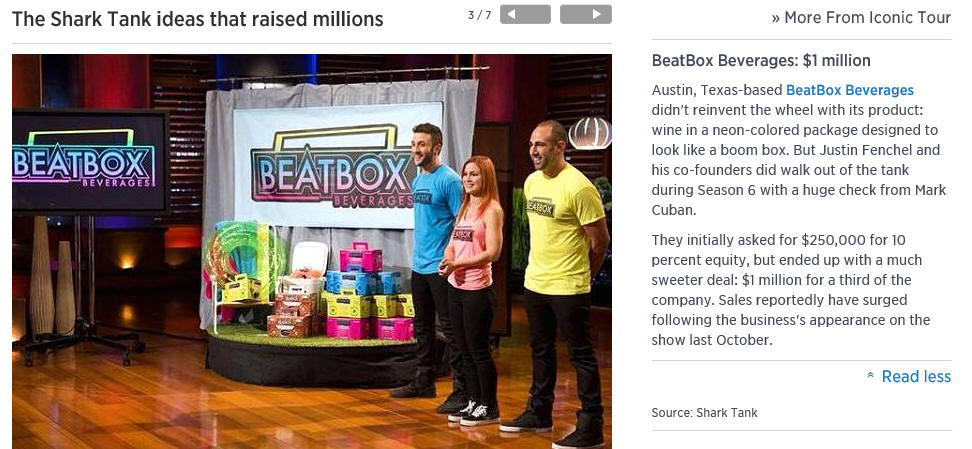
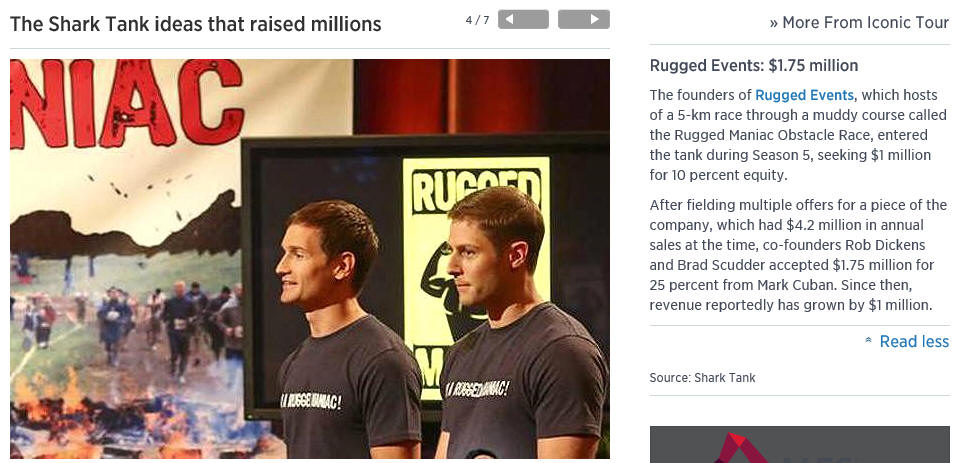
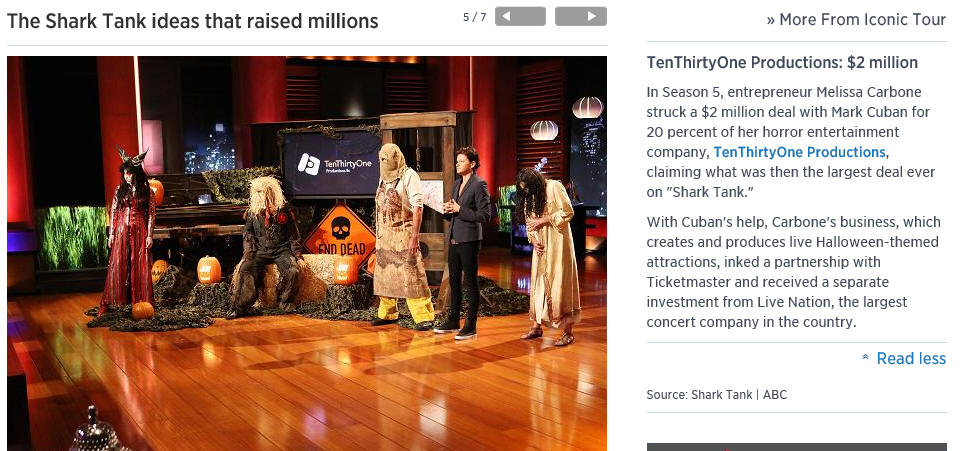
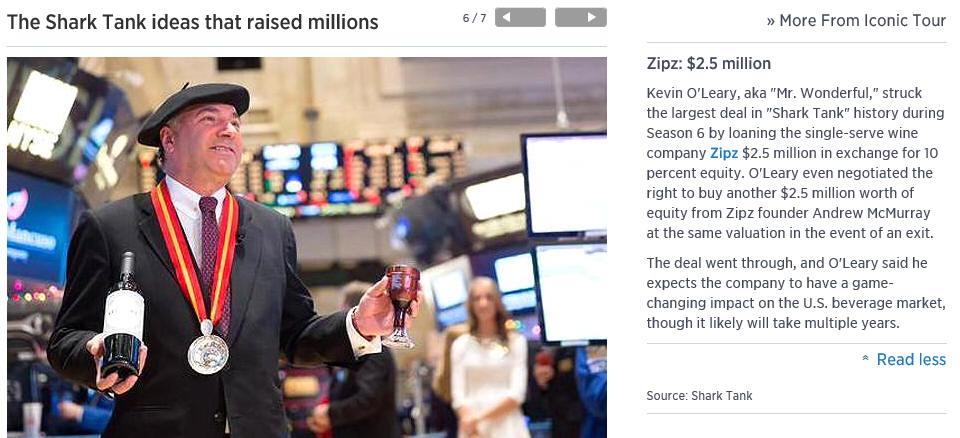
______________________
Non Shark Tank



















